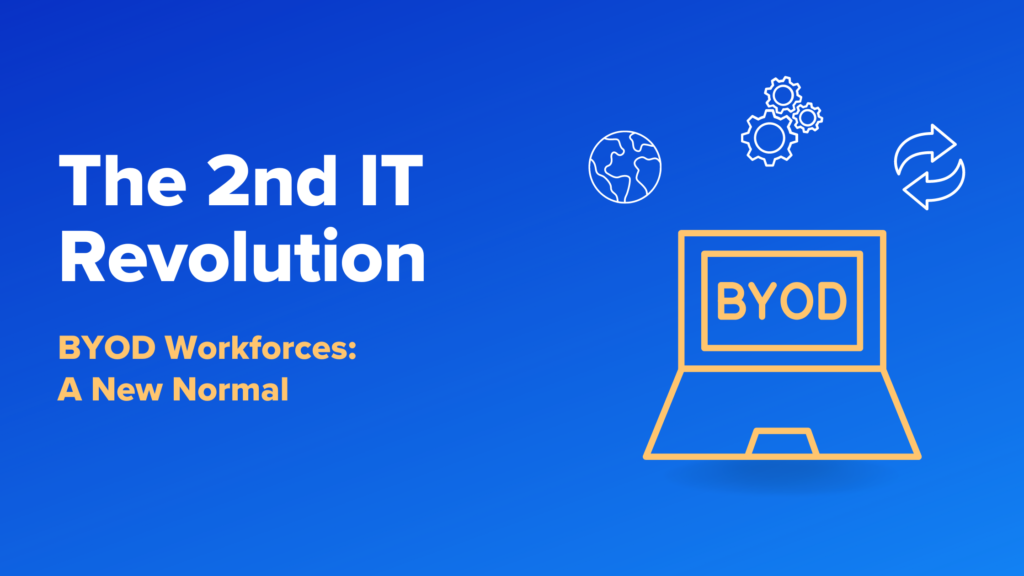Securing Remote Contractors with BYOD Laptops

The make-up of the modern workforce is evolving, driven by the rise in remote work and shifting employee preferences.
In fact, the number of independent workers in the US has almost doubled since 2020, according to a study by McKinsey. But with companies hiring more remote contractors, they are facing many new challenges, too.
In this blog, we will cover the obstacles that arise when hiring remote contractors, how companies tend to handle them, and how they can utilize secure BYOD to mitigate these challenges.
This blog post is based on the webinar, “Unleashing Efficiency: Remote Contractor Security with BYO-PC,” which you can watch here.
Why are companies hiring more remote contractors?
It’s true that the pandemic sparked an entirely new way of working overnight, but it is a shift that is sticking around for the long-haul.
Companies are increasingly relying on freelancers, off-shore workers, gig workers, and third-party contractors as integral parts of their operations. Why?
1. Lower labor costs for specialized talent
Remote contractors offer a more economical way to access specialized talent without compromising quality. For example, an employee in the Philippines requires a lower salary than someone of the same skillset working in Chicago.
This cost disparity underscores the significant savings potential for companies opting to hire remote workers.
2. Expanded talent pool
In that same vein, if companies don’t hire remote workers, they are limiting themselves to the talent pool in their immediate vicinity.
By expanding their scope to include the global market, companies can tap into a diverse array of skills and experiences that may not be available locally, allowing them to find the perfect fit for their specific needs.
3. Evolving workforce preferences
To top it off, there’s a noticeable trend of individuals who prefer contracting work over traditional full-time employment, with over 50% of the US workforce likely to participate in the gig economy by 2027.
If companies want to appeal to the modern workforce and attract top talent, offering remote contracting opportunities can be a strategic advantage.
But with all the benefits of this growing remote contractor community comes a brand new set of obstacles for companies.
Challenges of securing contractors on BYOD
Most remote contractors use their personal devices or third-party provided devices for work. This presents a slew of security and compliance risks for the hiring company, as they provide access to sensitive data and applications on devices they have no control over.
One of the primary concerns of contractor BYOD is the potential exposure of confidential data due to the use of potentially unsecured devices and connections. These unsecured devices leave vulnerabilities that malicious actors can exploit to gain unauthorized access to corporate networks and sensitive information.
Moreover, the decentralized nature of remote contracting exacerbates compliance challenges.
Ensuring that contractors adhere to regulatory requirements and internal security policies becomes increasingly complex when they operate outside the traditional corporate network. IT leaders are left grappling with the question of how to maintain compliance and security standards while accommodating remote contractors.
Addressing these challenges is possible, but it requires a modern approach if companies wish to be successful.
Typical approaches for securing contractors
When it comes to securing contractors, most companies take one of the following approaches: shipping and locking down computers, VDI or DaaS, or ignoring the problem.
Each comes with its own pitfalls.
Shipping and locking down computers is far more expensive than just the cost of the device itself. IT teams end up having to deal with device issues from afar, not to mention tracking down laptops when employees leave. This option is also difficult to scale and makes for a very lengthy onboarding process while new hires wait for their laptops to arrive in the mail.
VDI and DaaS have their benefits, but the fact of the matter is that they are extremely expensive, with costs increasing as volume increases. They also require a lot of back-end environments to be set up, managed, and continuously patched. This complex architecture requires a lot of IT expertise and energy, and the user experience is far from ideal, with latency issues a known hindrance to productivity.
Lastly, companies who choose to ignore the security issue of remote contractors leave themselves vulnerable to data breaches and make it impossible for themselves to maintain any sort of compliance.
Clearly, all of these approaches leave something to be desired when it comes to cost, security, and IT efficiency.
So, when determining how best to enable contractors on unmanaged devices, companies should take into account six key considerations:
- Secure sensitive data, applications, and network access
- Maintain compliance with any relevant regulations
- Control cost and complexity for IT teams
- Simplify onboarding and offboarding
- Separate usage of company information from other usage on the device
- Ensure convenience and privacy for end-user
The best solution for securing your remote contractors
The ideal computing method for remote contractors would enable them to use their unmanaged devices in a way that reduces IT complexity, improves the end-user experience, and doesn’t break the bank.
Luckily, such a solution exists: Venn.
Venn is the first purpose-built patented technology for Secure BYOD.
It secures remote work on any unmanaged or BYOD computer with a radically simplified and less costly solution than virtual desktops or having to lock down every PC.
With Venn, work lives in a company-controlled Secure Enclave installed on the user’s PC or Mac, where business activity is isolated and protected from any personal use on the same computer.
By choosing Venn, companies stand to completely secure their sensitive information on any remote contractors’ device while minimizing IT headaches and reducing costs.
If you want to see Venn in action, you can do so here.
Ronnie Shvueli
Senior Digital Content Marketing Manager
More Blogs


